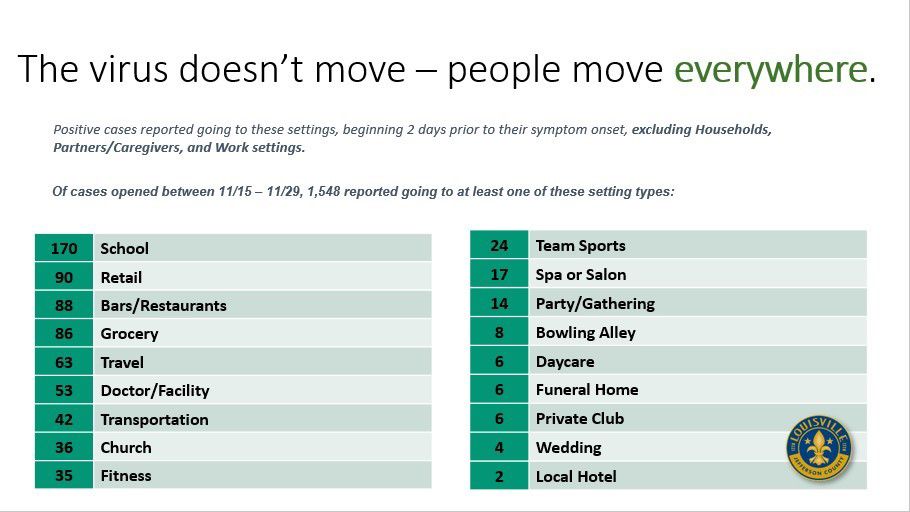LOUISVILLE, Ky. — If you contract COVID-19, do you know where you got it from? It's hard to tell, even for health departments and contact tracers.
What You Need To Know
- Health departments help track who you've come in contact with, not always exactly where you became infected
- Christmas could be a potential super spreader event if the public doesn't follow recommended winter holiday guidance
- Families may plan to gather indoors in close proximity, but household contacts are the number one source linked to cases in Jefferson County
- Most indoor settings, including indoor dining and bars, are also highly likely to contribute to the spread of COVID-19
Restaurants and bars opened back up to 50 percent capacity indoors on Mon., Dec. 14, after three weeks of closures as part of a November executive order to help mitigate the spread.
Now, Christmas is being called a potential super spreader, if people don’t follow Kentucky’s winter holiday guidelines.
Dr. Sarah Moyer, director of Louisville’s health department, said during the city’s Tuesday COVID-19 briefing that household contacts are the number one source linked to cases in Jefferson County.
“We’re seeing that once COVID[-19] breaks into your house, there’s a really high chance that your whole family, everyone living there, is going to get it, unless you are taking strict precautions. And, then it’s a host of reasons why that is being brought into the household whether it’s work, eating out, other gatherings outside the home, all are combined in that,” Dr. Moyer said.
Excluding households, partners, caregivers, and work settings, data collected by Louisville’s public health department from Nov. 15-29 showed 1,548 positive cases reported going to at least one public of 18 public settings, two days prior to symptoms one, that were shown during the city’s Dec. 1, 2020 briefing.

The top three of the public settings listed were school, retail, and bars/restaurants.
“It is rarely possible to trace a case back to the specific person or place where they became infected and therefore such local data does not exist," Northern Kentucky Health Department’s Director of Population Health Stephanie Vogel wrote in an email. "People diagnosed with COVID-19 tend to report more travel, gatherings, going to public places and eating at restaurants than people who have not gotten the virus.”
Vogel also said that the questions their health department asks people with COVID-19 regarding where they have been just prior to becoming ill is to identify people who are close contacts and need to quarantine, not for the purposes of identifying where they became infected.
“Studies have shown that indoor settings, including those where individuals consume food and beverages, increase the risk of exposure. People tend to be in the space longer and face coverings are not worn all the time,” Vogel wrote.
Dareen Tadros, Barren River District Health Department’s regional epidemiologist, said the trend of household transmission is the same in the Bowling Green area.
"Cases are linked to clusters related to households settings, events (such as weddings and funerals), churches, schools, worksites, long term care facilities, correctional facilities, etc.," Tadros wrote in an email.
Dr. Jon Klein, vice dean for research at University of Louisville School of Medicine said Saturday that indoor gatherings appear to be the most hazardous.
“Avoid those congregate settings, those settings where a lot of people who you are not living with are indoors for whatever reason. So I’m not going to pick on any one reason or another whether it’s bars or restaurants or Christmas parties… in general, it’s people outside of your house, indoor gatherings," Dr. Klein said.
This is Kentucky Department of Public Health’s winter holiday guidance:
- gatherings should be limited to two households and a maximum of eight people
- always wear a mask
- maintain social distance, 6 feet or more
- avoid large gatherings, especially those indoors
- don’t host or attend large parades or events
- avoid traveling, but if you do, be informed of the risks involved


